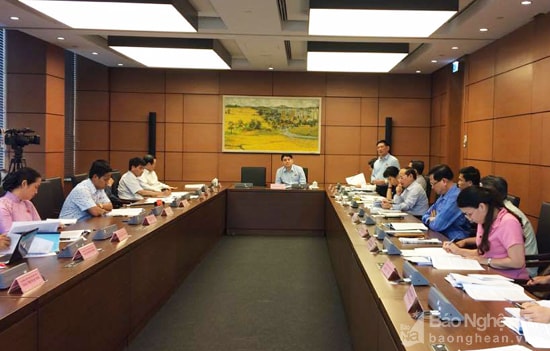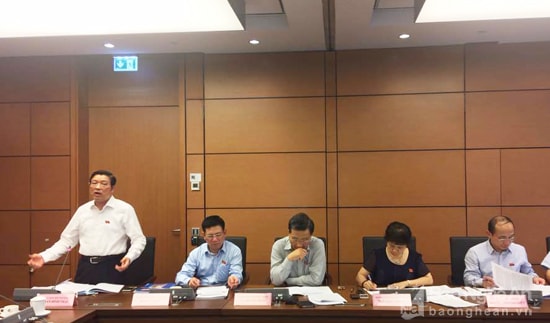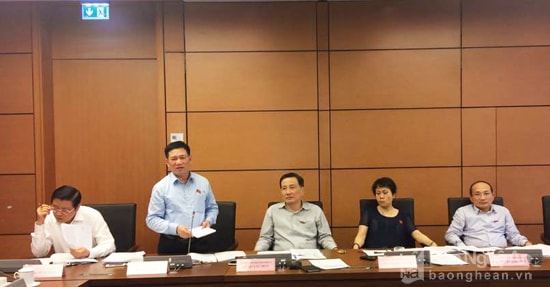Need to clarify regulations on not accepting and resolving anonymous complaints
(Baonghean.vn)- That is the opinion of the National Assembly delegate.Nghe An People's Council at the discussion session on the draft Law on Denunciation (amended) held on the afternoon of May 30.
 |
| Overview of the group discussion session. Photo: Thanh Loan |
On the afternoon of May 30, within the framework of the seventh working day of the 3rd session of the 14th National Assembly, the Nghe An National Assembly delegation participated in the group discussion to contribute ideas to the draft Law on Denunciation (amended) with units of Tra Vinh, Da Nang, and Lai Chau. Mr. Nguyen Dac Vinh - Member of the Party Central Committee, Secretary of the Provincial Party Committee, Head of the National Assembly delegation of Nghe An province chaired the group discussion session. |
Commenting on the draft Law on Denunciation (amended), delegate Hoang Thu Trang - Director of the Department of DenunciationNghe An Civil Judgment Enforcement Department believes that there should be a statute of limitations for denunciations because in reality, there are many cases that happened a long time ago, the documents are still there but the people are no longer there, leading to a waste of time and effort of state agencies.
Regarding the interpretation of the words in Article 2, Clause 5, "the accused is an agency, organization, or individual who has violated the law on denunciation", according to delegate Hoang Thu Trang, it is incorrect because "In the case of false accusation, it is clear that the accused has not violated the law", so it is proposed to change the phrase "has violated the law" to "accused of violating the law".
At the same time, a provision is added: if the person with the authority to resolve the complaint has a close relationship with the accused or the complainant, he/she is not allowed to participate in the resolution to ensure the objectivity and honesty of the case.
In addition, Ms. Hoang Thu Trang also expressed concern: Article 9 of the draft stipulates that the whistleblower must compensate for damages if he/she makes a false accusation causing serious consequences with intentional fault. According to Ms. Trang, a false whistleblower (whether intentional or unintentional) causing serious consequences to the accused must compensate according to the provisions of the law.
 |
| Delegate Phan Dinh Trac - Head of the Central Internal Affairs Committee spoke at the group discussion session. Photo: Thanh Loan |
Also related to the Law on Denunciation (amended), Mr. Phan Dinh Trac - Head of the Central Internal Affairs Committee said that the law should not regulate the form of denunciation via fax, email, or phone, but should only regulate two forms: Denunciation by petition and denunciation by word of mouth.
“Nowadays, the media is very modern, creating convenience for people, but also creating huge loopholes, even causing costs and difficulties for state agencies and competent authorities to handle,” Mr. Phan Dinh Trac explained. Regarding anonymous denunciations, according to Mr. Phan Dinh Trac, they should only be considered as reference information for the management of state agencies, not in the settlement process and not within the scope of the denunciation law. Therefore, they should not be regulated in this law.
Agreeing with the viewpoint of not accepting and resolving fake and anonymous petitions and not regulating the law on the form of denunciation via fax, email, or phone, Mr. Ho Duc Phoc - State Auditor General said: the regulation that direct denunciation must be made and then written to the competent authorities for settlement will ensure transparency about the subject and identity of the denouncer.
 |
| Delegate Ho Duc Phoc - State Auditor General speaking at the discussion session. Photo: Thanh Loan |
Regarding this content, Mr. Nguyen Huu Cau - Director of Nghe An Provincial Police Department said that the issue of not handling anonymous petitions as stipulated in Article 22 of the draft law is not clear. Therefore, it is proposed to adjust Article 22 to avoid misunderstanding that anonymous or impersonated petitions are still handled normally.
Regarding the duty to protect whistleblowers, according to Mr. Nguyen Huu Cau, it is necessary in cases where the denunciation is correct, but it is not appropriate in cases where the denunciation is false or the complaint is prolonged. Therefore, in the regulations on the responsibilities and obligations of whistleblowers, it is necessary to add a provision: the false whistleblowers must be responsible for repaying the entire protection fee when they request.
PV-CTV Group
| RELATED NEWS |
|---|

